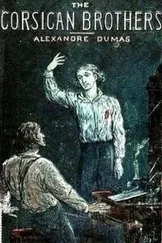Александр Дюма - The Conspirators
Здесь есть возможность читать онлайн «Александр Дюма - The Conspirators» весь текст электронной книги совершенно бесплатно (целиком полную версию без сокращений). В некоторых случаях можно слушать аудио, скачать через торрент в формате fb2 и присутствует краткое содержание. Год выпуска: 2014, Издательство: epubBooks Classics, Жанр: Историческая проза, на английском языке. Описание произведения, (предисловие) а так же отзывы посетителей доступны на портале библиотеки ЛибКат.
- Название:The Conspirators
- Автор:
- Издательство:epubBooks Classics
- Жанр:
- Год:2014
- ISBN:нет данных
- Рейтинг книги:3 / 5. Голосов: 1
-
Избранное:Добавить в избранное
- Отзывы:
-
Ваша оценка:
- 60
- 1
- 2
- 3
- 4
- 5
The Conspirators: краткое содержание, описание и аннотация
Предлагаем к чтению аннотацию, описание, краткое содержание или предисловие (зависит от того, что написал сам автор книги «The Conspirators»). Если вы не нашли необходимую информацию о книге — напишите в комментариях, мы постараемся отыскать её.
The Conspirators — читать онлайн бесплатно полную книгу (весь текст) целиком
Ниже представлен текст книги, разбитый по страницам. Система сохранения места последней прочитанной страницы, позволяет с удобством читать онлайн бесплатно книгу «The Conspirators», без необходимости каждый раз заново искать на чём Вы остановились. Поставьте закладку, и сможете в любой момент перейти на страницу, на которой закончили чтение.
Интервал:
Закладка:
They sent once more for the doctor. What he had feared was now no longer doubtful—brain fever had declared itself. At this moment some one knocked; it was Buvat, whom Brigaud and Boniface had found wandering to and fro before the house like a ghost; and who, not able to keep up any longer, had come to beg a seat in some corner, he did not care where, so long as from time to time he had news of Bathilde. The poor family were too sad themselves not to feel for the grief of others. Madame signed to Buvat to seat himself in a corner, and retired into her own room with Athenais, leaving Emilie once more with the sufferer. About daybreak Boniface returned: he had gone with Brigaud as far as the Barriere d'Enfer, where the abbe had left him, hoping—thanks to his good steed, and to his disguise—to reach the Spanish frontier.
Bathilde's delirium continued. All night she talked of Raoul; she often mentioned Buvat's name, and always accused him of having killed her lover. Buvat heard it, and, without daring to defend himself, to reply, or even to groan, had silently burst into tears, and, pondering on what means existed of repairing the evil he had caused, he at last arrived at a desperate resolution. He approached the bed, kissed the feverish hand of Bathilde, who did not recognize him, and went out.
Buvat had, in fact, determined on a bold course. It was to go himself to Dubois, tell him everything, and ask, as his recompense—not the payment of his arrears—not advancement at the library—but pardon for D'Harmental. It was the least that could be accorded to the man whom the regent himself had called the savior of France. Buvat did not doubt that he should soon return bearing good news, and that it would restore Bathilde to health.
Consequently Buvat went home to arrange his disordered dress, which bore the marks of the events of the day and the emotions of the night; and, moreover, he did not dare to present himself at the minister's house so early, for fear of disturbing him. His toilet finished, and as it was still only nine o'clock, he returned for a few minutes to Bathilde's room—it was that which the young girl had left the day before. Buvat sat down in the chair which she had quitted, touched the articles which she liked to touch, kissed the feet of the crucifix, which she kissed each night—one would have thought him a lover following the steps of his mistress.
Ten o'clock struck; it was the hour at which Buvat had often before repaired to the Palais Royal. The fear of being importunate gave place to the hope of being received as he had always been. He took his hat and cane, and called at Madame Denis's to ask how Bathilde had been during his absence; he found that she had never ceased to call for Raoul. The doctor had bled her for the third time. He raised his eyes to heaven, heaved a profound sigh, and set out for the Palais Royal.
The moment was unlucky. Dubois, who had been constantly on his feet for four or five days, suffered horribly from the malady which was to cause his death in a few months; moreover, he was beyond measure annoyed that only D'Harmental had been taken, and had just given orders to Leblanc and D'Argenson to press on the trial with all possible speed, when his valet–de–chambre, who was accustomed to see the worthy writer arrive every morning, announced M. Buvat.
"And who the devil is M. Buvat?"
"It is I, monseigneur," said the poor fellow, venturing to slip between the valet and the door, and bowing his honest head before the prime minister.
"Well, who are you?" asked Dubois, as if he had never seen him before.
"What, monseigneur!" exclaimed the astonished Buvat; "do you not recognize me? I come to congratulate you on the discovery of the conspiracy."
"I get congratulations enough of that kind—thanks for yours, M. Buvat," said Dubois, quietly.
"But, monseigneur, I come also to ask a favor."
"A favor! and on what grounds?"
"Monseigneur," stammered Buvat, "but—monseigneur—do you not remember that you promised me a—a recompense?"
"A recompense to you, you double idiot."
"What! monseigneur," continued poor Buvat, getting more and more frightened, "do you not recollect that you told me, here, in this very room, that I had my fortune at my fingers' ends?"
"And now," said Dubois, "I tell you that you have your life in your legs, for unless you decamp pretty quick—"
"But, monseigneur—"
"Ah! you reason with me, scoundrel," shouted Dubois, raising himself with one hand on the arm of his chair, and the other on his archbishop's crook, "wait, then, you shall see—"
Buvat had seen quite enough; at the threatening gesture of the premier he understood what was to follow, and turning round, he fled at full speed; but, quick as he was, he had still time to hear Dubois—with the most horrible oaths and curses—order his valet to beat him to death if ever again he put his foot inside the door of the Palais Royal.
Buvat understood that there was no hope in that direction, and that, not only must he renounce the idea of being of service to D'Harmental, but also of the payment of his arrears, in which he had fondly trusted. This chain of thought naturally reminded him that for eight days he had not been to the library—he was near there—he resolved to go to his office, if it was only to excuse himself to his superior, and relate to him the causes of his absence; but here a grief, not less terrible than the rest, was in store for Buvat; on opening the door of his office, he saw his seat occupied—a stranger had been appointed to his place!
As he had never before—during the whole fifteen years—been an hour late, the curator had imagined him dead, and had replaced him. Buvat had lost his situation for having saved France!
This last stroke was more than he could bear, and Buvat returned home almost as ill as Bathilde.
Chapter XL
Boniface
As we have seen, Dubois urged on the trial of D'Harmental, hoping that his revelations would furnish him with weapons against those whom he wished to attack, but D'Harmental took refuge in a total denial with respect to others. As to what concerned himself personally, he confessed everything, saying, that his attempt on the regent was the result of private revenge, a revenge which had arisen from the injustice which had been done him in depriving him of his regiment. As to the men who had accompanied him, and who had lent him their aid in the execution of his plans, he declared that they were poor devils of peasants, who did not even know whom they were escorting. All this was not highly probable, but there was no means of bringing anything beyond the answers of the accused to bear on the matter; the consequence was, that to the infinite annoyance of Dubois, the real criminals escaped his vengeance, under cover of the eternal denials of the chevalier, who denied having seen Monsieur or Madame de Maine more than once or twice in his life, or ever having been trusted with any political mission by either of them.
They had arrested successively Laval, Pompadour, and Valef, and had taken them to the Bastille, but they knew that they might rely upon the chevalier; and, as the situation in which they found themselves had been foreseen, and it had been agreed what each should say, they all entirely denied any knowledge of the affair, confessing associations with Monsieur and Madame de Maine, but saying that those associations were confined to a respectful friendship. As to D'Harmental, they knew him, they said, for a man of honor, who complained of a great injustice which had been done to him. They were confronted, one after the other, with the chevalier; but these interviews had no other result than that of confirming each in his system of defense, and showing each that the system was religiously adhered to by his companion.
Читать дальшеИнтервал:
Закладка:
Похожие книги на «The Conspirators»
Представляем Вашему вниманию похожие книги на «The Conspirators» списком для выбора. Мы отобрали схожую по названию и смыслу литературу в надежде предоставить читателям больше вариантов отыскать новые, интересные, ещё непрочитанные произведения.
Обсуждение, отзывы о книге «The Conspirators» и просто собственные мнения читателей. Оставьте ваши комментарии, напишите, что Вы думаете о произведении, его смысле или главных героях. Укажите что конкретно понравилось, а что нет, и почему Вы так считаете.












